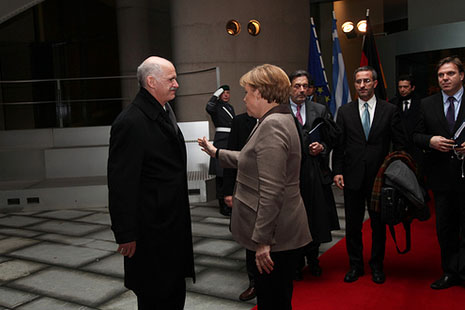LAST WEEK Europe faced the prospect of a crisis that would have dwarfed the global financial crisis. For now, however, the threat has passed. Share values have recovered – at the Frankfurt stock exchange, the DAX index keeps rising and rising – and the markets, they say, are optimistic. There is no more talk of the impending collapse of the Greek economy or the spectre of national insolvency in Ireland, Italy, Spain and Portugal. And on Wednesday the European Commission approved the introduction of the euro in yet another country with a comparatively weak economy, Estonia. Despite a lukewarm report by the European Central Bank on Estonia’s ability to meet its obligations and contain inflationary pressures, the commission found that the tiny former Soviet nation was ready to adopt the euro from 1 January 2011. That was a show of confidence – and not just in Estonia’s capacity to adapt to a new economic environment.
The blame for the recent troubles in Europe – which, despite the rising share prices, are far from over – has been attributed to the Greek economy and the succession of Greek governments that condoned and underreported high levels of debt. While Greece is portrayed as the main protagonist in the recent drama, the role played by Germany has largely been overlooked. Not only has the German economy been a beneficiary of the eurozone (and should therefore share some responsibility for the travails of the countries that were disadvantaged by the introduction of the euro, it could be argued), but Germany might also need to take some of the blame for the panic that stopped just short of paralysing the European economies.
Some of Germany’s neighbours have accused Angela Merkel’s government of having worsened the financial crisis by procrastinating. Germany’s indecisiveness, so the story goes, gave rise to rumours about the impending collapse of the Spanish and Portuguese economies – rumours that, so far at least, have proven unfounded. Italy’s finance minister Giulio Tremonti told RAI television: “If your neighbour’s house is on fire and we have a fire extinguisher, the expedient thing to do is to use it so the flames don’t leap to the neighbours’ houses.” For the benefit of those who couldn’t identify his target, he added: “I’m talking about Germany, in case you didn’t get that.”
Why did the Merkel government not rush to the aid of Greece, when it was apparent that the German economy, too, would be in dire straits if Greece were unable to service its debts? Could it be that the coalition of Christian Democrats and Liberals is dominated by Eurosceptics? Most certainly not. Unlike Britain, where the new prime minister is wary of European integration, Germany’s politicians are by and large Europhiles. They have been for a long time. Euroscepticism has never won an election in Germany.
The discussion about Greece ran hot in Germany and dominated the final phase of the state election campaign in North Rhine–Westphalia. In fact, the government’s hesitant response to Greece’s request for financial assistance might have been prompted by fears that the speedy use of a largely German-funded fire extinguisher – to use Tremonti’s image – would result in a poor showing for the governing parties in Germany’s most populous state.
According to opinion polls, about three-quarters of Germans were against providing financial support to Greece, a far greater proportion than were opposed in France and other eurozone countries. Again, this is not a reflection of widespread Euroscepticism, and nor do such results betray anti-Greek sentiments in Germany.
Rather than being evidence of nationwide antagonism towards southerners in general or Greeks in particular, or towards the project of a united Europe, the opinion polls are evidence of a collective nostalgia. Many Germans yearn for the return of the symbol of postwar German identity, the Deutschmark. Yes, they are happy to be part of the European Union (and much more inclined to champion more far-reaching powers for the European Parliament and the European Commission than many other Europeans), but why, they ask, did we have to exchange the Deutschmark for the suro?
Germans’ fixation with the Deutschmark has a historical background. While Australians remember the Great Depression as by far the greatest economic misfortune to have befallen the country in the past 100 years, Germans, who experienced massive unemployment during the depression of the late 1920s and early 1930s and famine during the first world war and in the immediate postwar years, regard the hyperinflation of the early 1920s as the defining economic catastrophe. In 1923, Germany’s central bank issued banknotes with a face value of 100,000,000,000,000 marks – but at the height of the inflation, these 100-trillion mark notes were worth only about US$25. Those who had put their money in the bank lost their entire savings.
The Deutschmark was introduced in June 1948 at the instigation of the American occupiers. It sealed the division between the so-called western zones (which became the Federal Republic of Germany in 1949) and the eastern zone (which became the German Democratic Republic). It took West Germans some time to embrace the new currency, but when they did, they did so from their hearts. Since Hitler’s suicide, Germans had been without somebody or something that they, as a collective, could be in love with. It was the appearance of the Deutschmark as the new focus of German desires that seemingly made denazification complete.
Germans had good reasons to love the Deutschmark. By the mid 1950s it had become the guarantor of stability and the symbol of prosperity. In a world dominated by fear – of Russian invasion, of nuclear annihilation and of rock’n’roll – the Deutschmark promised security. Its properties assumed mythical proportions, as if its mere existence kept inflation at bay, savings safe and the economy growing.
In Das Wesen des Geldes, his treatise on money, the economist Joseph Schumpeter wrote that a people’s monetary system “reflects everything that a people wants, does, suffers, is… There is no better indicator of the stuff a people is made from than its monetary policy.” The German central bank’s policy to keep the Deutschmark strong and to counteract inflationary pressures, and its successful insistence that politicians not meddle in its affairs, suited postwar West Germans, who still shuddered at the memory of hyperinflation (more so than at recalling Auschwitz or the second world war).
West Germans did not tend to know the words of their national anthem and were unlikely to decorate their houses with the German flag. Patriotic fervour found its expression, instead, in a veneration of the Federal Republic’s currency. West Germans were intensely proud of the respect the Deutschmark commanded abroad, evidenced by the prominent role it played as a currency reserve for central banks across the world. They were also proud that the Deutschmark was strong – something they experienced for themselves when holidaying in Italy.
On the other side of the Iron Curtain, East Germans took the Deutschmark to be the key to the riches of the West, images of which were broadcast daily into their living rooms courtesy of West German television. No wonder, then, that after the wall came down in November 1989, East Germans were not so much interested in a political union with the Federal Republic as in an arrangement that would allow them access to the Deutschmark. Debates about reunification might have been expected to focus on questions of identity and on the differences between, and common features of, West and East German cultures. Instead, they were dominated by questions about the timing and exact nature of the monetary union, which preceded the political union by several months. In a widely discussed article in the weekly Zeit in March 1990, German philosopher Jürgen Habermas coined the term “Deutschmark nationalism” to criticise East Germans for their interest in economic progress rather than democracy.
It was reunification more than anything else that tarnished the Deutschmark’s reputation and led to its eventual downfall. Despite the strong reservations of the Federal Republic’s central bank, East Germans were able to change their mark for Deutschmark at the rate of 1:1. The bank had been taken by surprise when Chancellor Helmut Kohl announced the monetary union in February 1990, and could point to a significant imbalance between the values of the two currencies. This political concession to East Germans proved disastrous for the German economy and hampered the speedy economic integration of the Federal Republic’s new East German states.
The majority of Germans were unhappy about the introduction of the euro on 1 January 1999. But they were told that the euro would be modelled on the Deutschmark, and that the European central bank would follow established German monetary policies (according to which it was a central bank’s key function to keep inflation at bay). The European Central Bank was to be a mightier version of the monstre de Francfort, as the French called the Bundesbank, the German Central Bank in Frankfurt. The euro would do for the eurozone countries what the Deutschmark supposedly had accomplished for the Federal Republic.
IN THE RECENT debate in the German parliament about whether or not Germany ought to sign off on the rescue package negotiated between the European Union and Greece, only one party, the Linke (Left) voted against the government’s bill. In the recent state elections in North Rhine–Westphalia, the Left, which won only 5.6 per cent of the vote, was not able to attract a significant share of voters antagonistic towards the Greek deal. Neither could the Liberals, whose local leader, Andreas Pinkwart, had campaigned against providing assistance to Greece. The ruling coalition of Christian Democrats and Liberals lost the election, for sure, but they might well have lost it anyway.
What Germans mean when they say they don’t like the Greek deal is that they still dream of the Deutschmark and all that it stood for. They dream, rather than act (not even at the ballot box).
Dreaming of those good old days, Germans take some pleasure from reading in their newspapers about corruption and mismanagement in Greece. In turn, Greeks, who face unprecedented austerity measures and structural changes, may derive some pleasure from taking issue with Germans for their lack of empathy and calling for a boycott of German goods.
And maybe Greek opinion-makers are right in blaming the Germans – although perhaps for different reasons from those advanced in the debate in Greece. Rather than acting decisively and swiftly (like the French government when it promptly approved its share of the bail-out, which is almost as large as Germany’s), German politicians misread public sentiment. They feared a popular backlash that would cost them electorally. They failed to recognise that their constituents were merely dreaming – of a time when the only change was steady progress and the Deutschmark was the guarantor of stability, of a world without the complexities brought about by globalisation, of a Germany where parochialism was considered a virtue. Or maybe Merkel and company were also dreaming, lost in narcissistic reverie much like their fellow Germans. Maybe they failed to use the fire extinguisher swiftly simply because they were oblivious to the fire that was about to engulf their neighbour’s house. •




